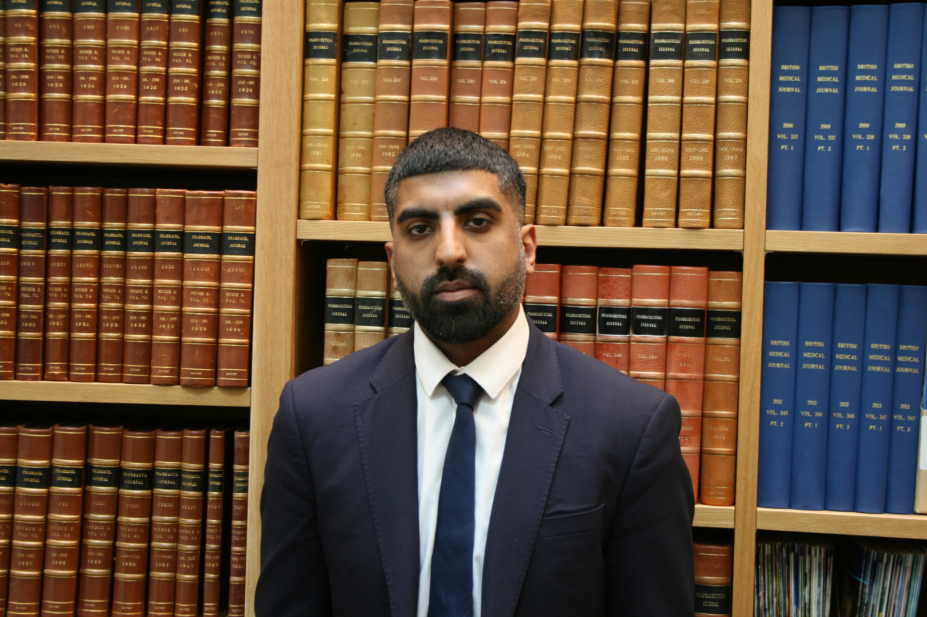
Nic Bunce / The Pharmaceutical Journal
Ravi Sharma became director for England at the Royal Pharmaceutical Society (RPS) in November 2018, taking over from Robbie Turner. Before this, he was NHS England’s national lead for clinical pharmacy and he also sits on the NHS Assembly, which was set up to support the delivery of the ‘NHS Long Term Plan’, while keeping his hand in frontline pharmacy, working in general practice once every fortnight.
What’s your background?
I started as a locum pharmacist for a small independent chain of community pharmacies. This developed into a relief pharmacist role for the company, but I was made redundant after a few months. I saw this as an opportunity for me to reflect on my future career and, not long after that, I saw a GP at a conference speaking about how other healthcare professionals could support general practice and the NHS by playing a greater role. I ended up being employed by that GP to do some scoping on the role of pharmacists working in general practice and how they could help support patient care.
I then went on to develop a team of pharmacists working across general practice, care homes and NHS walk-in centres, as they were called at the time. As part of this, we developed an education and training platform for pharmacists working in these new integrated roles and supported my whole team to become independent prescribers. Our team worked with Gail Fleming, director for education and professional development at the RPS, in her previous role at Health Education England, to develop shared placements for preregistration pharmacists.
After that I went to work for Greenlight Healthcare and helped start up their outreach model of pharmacists from community pharmacies supporting general practice.
In 2016, I joined NHS England as its national clinical lead for clinical pharmacy. As part of this role, I led on the implementation of pharmacists in general practice, as well as supporting other areas of work, such as workforce development, care homes, and medicines safety and optimisation. During my time there, I received a scholarship to do a Master’s in genomic medicines at Imperial College London, focusing on pharmacogenomics and its implementation into the NHS. This enabled me to become the national clinical lead for clinical pharmacy and genomics.
When the role as director for England at the RPS came up, I saw it as an opportunity for me to take on a new challenge. I started this role at the RPS in November 2018, but I continue to work one day every couple of weeks in general practice. This keeps me in touch with clinical practice and enables me to understand what frontline clinicians need to support members of the public on a day-to-day basis — this really helps when working on policy.
Can you tell me about your plan for RPS England?
Working with the English Pharmacy Board, we have agreed a one-to-three-year work plan, which is focussed on responding to the ‘NHS Long Term Plan’. We have been horizon-scanning and setting out our priorities, broken down into three main areas.
First, we will continue promoting the clinical expertise of pharmacists across healthcare and the developing NHS structures, cementing pharmacists’ leadership role in medicines. It’s vital that pharmacists play a pivotal role in primary care networks and integrated care system delivery plans. Other priorities will include medicines safety, medicines optimisation, prevention, and public health and social care prescribing.
The second area is workforce development, working closely with the RPS’s education directorate. We will be looking at workforce pressures and the mental health and wellbeing of pharmacists. Pharmacists do an incredible job to support members of the public, but as the role of the pharmacist extends across the NHS, we need to ensure that our frontline staff are well supported in their working environments.
Healthcare technology is expanding fast, but is pharmacy ready to adapt?
The third aspect is the role for pharmacy in futuristic healthcare. We will set a benchmark on where we see the role of pharmacists in the next five to ten years in areas including digital medicine, genomics, artificial intelligence and robotics. We want to see pharmacists taking a leading role on such exciting areas. Healthcare technology is expanding fast, but is pharmacy ready to adapt? We want to set a clear vision for this to ensure we are not left behind.
One of the Society’s three campaigns for 2019 is around system leadership: what’s happening there?
I’m excited about the system leadership work: we’ve got a great team of regional liaison pharmacists in Amandeep Doll, Nicola Gray and Stephanie West. Aligned to the ‘NHS Long Term Plan’, we’re looking at primary care networks and integrated care systems. People also need to understand what skills, resources and tools they need for their continuing professional development to become system leaders, if they aspire to that.
The team has developed tools and resources to support pharmacists to explore the opportunities for medicines optimisation through integrated health and care systems. The resources will provide case studies and links to tools and guides to support development of the leadership qualities required to work collaboratively across boundaries. The guidance will be useful for pharmacists already in leadership roles and for those ready to take their first steps into system leadership.
Alongside this, there will be a series of engagement events and webinars. We hope to launch this work in summer 2019.
There will also be campaigns on diabetes and mental health: what outcomes will members see from those?
Regionally, locally and across systems and commissioner levels, we want to get recognition that the profession has an absolute role to play in the management of people with type 2 diabetes mellitus: not just on the medicines side, but also in care. We need an educated and trained workforce, and we want to see career progression at general, specialist and consultant level. There’ll be a robust delivery plan around this, partnering with the events and education team. The campaign will, essentially, be a policy document that will have some recommendations associated with it.
The pressure on pharmacists, and on other healthcare professionals on the frontline, is increasing
The mental health work we have already done, to promote pharmacist involvement in mental health care, was great; the RPS produced a useful document that had lots of valuable information about how pharmacists can support people with their mental health.
We want to promote this work, but have a focus on the mental health and wellbeing of pharmacists. We will use our mental health refresher campaign to focus on workforce pressures: how do we support the mental wellbeing of frontline clinicians and our members? How do we work with pharmacists, the NHS, employers and major partners to make working environments and conditions better?
The pressure on pharmacists, and on other healthcare professionals on the frontline, is increasing. It is important that we are listening to our members’ needs while supporting them all in their current and future roles.
What are you hearing from members — what do they want from the RPS?
One thing I’ve noticed recently, particularly from early careers pharmacists who are looking for their next job, is questions on how the RPS can support them. Being able to give them practical support, such as interview techniques and advice on continuing professional development, and support with revalidation, is important — as is how you support all pharmacist throughout their whole careers.
I have gone from being an RPS member to an employee. It is safe to say there is lots of great work that goes on across the entire organisation. The people here are working hard to ensure whatever we do has clear benefits to members and the public. We are trying to really lead the profession — there is some incredible work across the organisation on professional development, education, communications, policy and publishing. We need to get recognition of all the resources that we have: it’s important that people know about all of the stuff they can get as part of membership.
As director for England, how do you work with RPS Scotland and Wales?
All three national teams now form part of the pharmacy and membership experience directorate led by Robbie Turner. This brings all three countries — as well as communications, marketing, membership, events and the professional standards and support team — together.
My team works really well with teams across Wales and Scotland
My team works really well with teams across Wales and Scotland. We continually share knowledge, experience and expertise. We all want to ensure we speak with one voice across Great Britain when lobbying government, the NHS and when working in partnership with others.
What are your ambitions for your directorship over the next year, and longer term?
We want to support our members more and be more relevant, inspiring and empathetic to the current situation for pharmacists. We also want to give them more vision in terms of where their future careers could go and how their roles could develop, and the opportunities for the profession. We also need to transcribe the jargon of policy into real-word terms: ‘What does this actually mean for people on the ground?’
I’d like to see England focus on opportunities for engagement across Great Britain: how do we bring people together; how do we bridge networks at a local and regional level to help people share best practice, and see areas that they can work collaboratively on?
Over the next year, I plan to listen and seek out perspectives from our members; provide a clear vision for the RPS in England and focus on delivery that has high impact and benefits our members.
We want to see the pharmacy profession flourish. We want to see pharmacists get the recognition they deserve for all their hard work. We want their workplace environments to be good and safe places to work. We want our members to feel supported in their roles by RPS.
I can’t wait to be part of delivering a more vibrant future for both our members and the whole profession.

